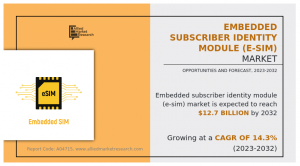Embedded Subscriber Identity Module (e-SIM) Market to Witness a Pronounce Growth During 2022 To 2032
Embedded Subscriber Identity Module (e-SIM) Market Expected to Reach $12.7 Billion by 2032—Allied Market Research
Request for Sample PDF: https://www.alliedmarketresearch.com/request-sample/5077
An embedded subscriber identity module (E-SIM) is a type of SIM card that is embedded directly into a device during the manufacturing process. It is a small chip or module that serves the same purpose as a traditional SIM card: to identify and authenticate the device on a mobile network. However, E-SIMs are permanently integrated into the device's hardware. They cannot be accessed or changed by the user, unlike physical SIM cards that can be physically inserted or removed from a device. E-SIMs may be remotely activated, provisioned, and managed by mobile network operators (MNOs) over the air, offering greater flexibility and convenience for users to switch between different mobile network operators or plans without physically changing SIM cards.
Enhanced security is a significant driver behind the growth of the embedded subscriber identity module (E-SIM) market share. E-SIMs offer robust security measures to protect user data and ensure secure communication. One of the key security features of E-SIM technology is the incorporation of tamper-resistant hardware and encryption mechanisms. These security measures make it extremely difficult for unauthorized access or tampering with the E-SIM. As a result, industries that handle sensitive information, such as healthcare, finance, and government, have increasingly adopted E-SIM technology to ensure secure connectivity. Thus, driving the Embedded Subscriber Identity Module (e-SIM) Market Growth For example, in healthcare, E-SIMs may be used in connected medical devices or telehealth solutions to transmit patient data and maintain privacy securely. Similarly, in the finance sector, E-SIMs provide secure connectivity for mobile banking and payment applications, protecting user information from potential breaches. The enhanced security offered by E-SIM technology addresses the growing concerns of data privacy and protection, making it an attractive solution for industries where secure connectivity is crucial.
Get a Customized Research Report @ https://www.alliedmarketresearch.com/request-for-customization/5077
However, the complex implementation of E-SIM technology poses a restraint, particularly for smaller device manufacturers. Integrating E-SIM into devices and ensuring compatibility with different networks requires substantial investments in research, development, and testing. This process may be time-consuming and expensive, creating a barrier for manufacturers with limited resources. The intricacies of E-SIM integration, including software development, security measures, and certification processes, add complexity to the manufacturing process. Smaller manufacturers may face challenges in allocating the necessary resources and expertise, potentially slowing down their adoption of E-SIM technology compared to larger, more established manufacturers.
Competitive Analysis:
The Embedded Subscriber Identity Module (e-SIM) industry's key market players adopt various strategies such as product launch, product development, collaboration, partnership, and agreements to influence the market. It includes details about the key players in the market's strengths, product portfolio, market size, and share analysis, operational results, and market positioning.
Some of the major key players in the global Embedded Subscriber Identity Module (e-SIM) market include,
Deutsche Telekom AG
Thales
Vodafone Group Plc
NXP Semiconductors
Giesecke+Devrient Mobile Security GmbH
NTT DOCOMO, Inc.
Infineon Technologies AG
Telenor group
Sierra Wireless
STMicroelectronics
Procure Complete Report: https://www.alliedmarketresearch.com/checkout-final/008e6b7ac8a119ab2fa77befd364a29c
On the other hand, embedded SIM technology offers significant opportunities for telecommunications companies to enhance their service offerings. Mobile network operators (MNOs) may provide customers with flexible plans that allow them to switch providers easily with a digital SIM card, with an E-SIM. This means that customers may change their service provider or subscription plan seamlessly, directly from their device settings. In addition, E-SIM enables remote provisioning and management of E-SIM profiles, eliminating the need for physical distribution and activation of SIM cards. This reduces logistics costs and streamlines the onboarding process for customers. Moreover, telecom operators may remotely manage and update E-SIM profiles, providing a more efficient and personalized customer experience. Overall, E-SIM technology empowers telecom companies to offer flexible plans, simplify logistics, and enhance customer satisfaction through improved service management and customization options.
The embedded subscriber identity module (e-SIM) market analysis is segmented based on application, industry vertical, and region. Based on application, the market is divided into connected cars, smartphones & tablets, wearable devices, and others. Based on industry vertical, the market is segregated into automotive, consumer electronics, manufacturing, telecommunication, transportation & logistics, and others. Based on region, the Embedded Subscriber Identity Module (e-SIM) Market Trends are analyzed across North America (the U.S., Canada, and Mexico), Europe (the UK, Germany, France, Italy, and Rest of Europe), Asia-Pacific (China, Japan, India, South Korea, and Rest of Asia-Pacific) and LAMEA (Latin America, Middle East, and Africa).
Enquiry Before Buying: https://www.alliedmarketresearch.com/purchase-enquiry/5077
KEY FINDINGS OF THE STUDY
- In 2022, by application, the connected car segment was the highest revenue contributor to the market, with $1,196.9 million in 2022, and is estimated to reach $5,054.47 million by 2032, with a CAGR of 15.58%.
- By industry vertical, the automotive segment was the highest revenue contributor to the market, with $839.59 million in 2022, and is estimated to reach $3,453.94 million by 2032, with a CAGR of 15.28%.
- By region, North America was the highest revenue contributor, accounting for $1,084.01 million in 2022, and is estimated to reach $4,501.46 million by 2032, with a CAGR of 15.39%.
About Us:
Allied Market Research is a top provider of market intelligence that offers reports from leading technology publishers. Our in-depth market assessments in our research reports consider significant technological advancements in the sector. In addition to other areas of expertise, AMR focuses on analyzing high-tech and advanced production systems. We have a team of experts who compile thorough research reports and actively advise leading businesses to enhance their current procedures. Our experts have a wealth of knowledge on the topics they cover. Also, they use a variety of tools and techniques when gathering and analyzing data, including patented data sources.
David Correa
Allied Market Research
+ +1 800-792-5285
email us here
Visit us on social media:
LinkedIn
Facebook
YouTube
X
Legal Disclaimer:
EIN Presswire provides this news content "as is" without warranty of any kind. We do not accept any responsibility or liability for the accuracy, content, images, videos, licenses, completeness, legality, or reliability of the information contained in this article. If you have any complaints or copyright issues related to this article, kindly contact the author above.
Clean Group Commercial Cleaning moves in to heart of Sydney CBD with the new office address
Graphene Water Purification Market to Hit USD 536.3 Million by 2034, Advancing Clean Water and Sustainability
BlackVue ELITE 8 Series Redefines Vehicle Surveillance with Extended Parking Mode and Unmatched Low-Light Performance
Kalendarium
Więcej ważnych informacji
 Jedynka Newserii
Jedynka Newserii

 Jedynka Newserii
Jedynka Newserii

Handel

Ważą się losy wymiany handlowej między Stanami Zjednoczonymi a Unią Europejską. Na wysokich cłach stracą obie strony
Komisja Europejska przedstawiła w poniedziałek propozycję ceł na import z USA o wartości 72 mld euro, co ma być odpowiedzią na nałożenie 30-proc. stawek na import z UE zapowiedziane przez Amerykanów w poprzednim tygodniu. Przedstawiciele KE wciąż widzą jednak potencjał kontynuowania negocjacji. Zdaniem europosła Michała Koboski brak porozumienia lub uzgodnienie stawek wyższych niż 10-proc. nie tylko zaszkodzi obydwu stronom, ale i osłabi ich pozycję na arenie międzynarodowej.
Handel
Nie tylko konsumenci starają się kupować bardziej odpowiedzialne. Część firm już stawia na to mocny nacisk

Kwestie równoważonych zakupów stają się elementem strategii ESG. Dostawy energii, zamówienia surowców i materiałów do produkcji czy elementów wyposażenia biur – na każdym etapie swoich zakupów firmy mogą dziś decydować między opcjami bardziej i mniej zrównoważonymi. Dotyczy to także zamówień rzeczy codziennego użytku dla pracowników czy środków czystości – wskazują eksperci Lyreco, e-sklepu, który prowadzi sprzedaż produktów do biur, pokazując ich wpływ na środowisko czy efektywność pracy.
Prawo
Unia Europejska wzmacnia ochronę najmłodszych. Parlament Europejski chce, by test praw dziecka był nowym standardem w legislacji

Parlament Europejski chciałby tzw. testu praw dziecka dla każdego aktu prawnego wychodzącego z Komisji Europejskiej. – Każda nowa legislacja Unii Europejskiej powinna być sprawdzana pod kątem wpływu na prawa dziecka – zapowiada Ewa Kopacz, wiceprzewodnicząca PE. Jak podkreśla, głos dzieci jest coraz lepiej słyszalny w UE i jej różnych politykach. Same dzieci wskazują na ważne dla siebie kwestie, którymi UE powinna się zajmować. Wśród nich są wyzwania w obszarze cyfrowym i edukacyjnym.
Partner serwisu
Szkolenia

Akademia Newserii
Akademia Newserii to projekt, w ramach którego najlepsi polscy dziennikarze biznesowi, giełdowi oraz lifestylowi, a także szkoleniowcy z wieloletnim doświadczeniem dzielą się swoją wiedzą nt. pracy z mediami.








.gif)



